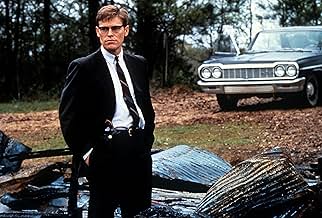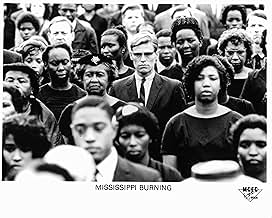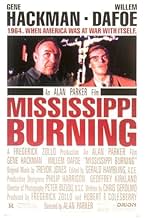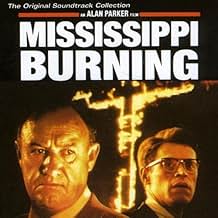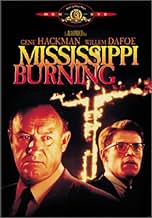दो एफबीआई। बेतहाशा अलग शैलियों वाले एजेंट कुछ नागरिक अधिकार कार्यकर्ताओं के लापता होने की जांच करने के लिए मिसिसिपी पहुंचते हैं।दो एफबीआई। बेतहाशा अलग शैलियों वाले एजेंट कुछ नागरिक अधिकार कार्यकर्ताओं के लापता होने की जांच करने के लिए मिसिसिपी पहुंचते हैं।दो एफबीआई। बेतहाशा अलग शैलियों वाले एजेंट कुछ नागरिक अधिकार कार्यकर्ताओं के लापता होने की जांच करने के लिए मिसिसिपी पहुंचते हैं।
- 1 ऑस्कर जीते
- 17 जीत और कुल 25 नामांकन
- Judge
- (as Tom Mason)
कहानी
क्या आपको पता है
- ट्रिवियाThe film is inspired by the murder of voting rights activists James Chaney, Michael Schwerner, and Andrew Goodman by the Ku Klux Klan.
- गूफ़When Anderson throws Pell into the chairs at the barbershop, Pell's stunt double has a different hairstyle (balding, with a comb-over).
- भाव
Ward: Where does it come from? All this hatred?
Anderson: You know, when I was a little boy, there was an old negro farmer that lived down the road from us, name of Monroe. And he was... well, I guess he was just a little luckier than my daddy was. He bought himself a mule. That was a big deal around that town. My daddy hated that mule, 'cause his friends were always kidding him that they saw Monroe out plowing with his new mule, and Monroe was going to rent another field now he had a mule. One morning, that mule showed up dead. They poisoned the water. After that, there wasn't any mention about that mule around my daddy. It just never came up. One time, we were driving down that road, and we passed Monroe's place and we saw it was empty. He just packed up and left, I guess, he must of went up north or something. I looked over at my daddy's face. I knew he done it. He saw that I knew. He was ashamed. I guess he was ashamed. He looked at me and said, If you ain't better than a nigger, son, who are you better than?
Ward: You think that's an excuse?
Anderson: No it's not an excuse. It's just a story about my daddy.
Ward: Where's that leave you?
Anderson: My old man was just so full of hate that he didn't know that bein' poor was what was killing him.
- साउंडट्रैकTake My Hand Precious Lord
Words and Music by Thomas A. Dorsey
Performed by Mahalia Jackson
Courtesy of CBS Records
Director Alan Parker has been down this road before with Midnight Express, another crushing, gut-wrenching tale based on a true story. In both cases, a great deal of liberty is taken with the facts, but that doesn't matter. Mississippi Burning is not a docudrama or an A & E special, it is at its heart, a police drama, and a near perfect one at that.
It is criticized by some for its depiction of southerners of the time as a group of brain-dead racists with no moral fiber whatsoever. I don't believe that is the movie's intention, but it spends time showing this side of society to make us understand how hate breeds itself, and how it becomes a way of life and an accepted standard. As one character states, "When we were seven years old, they told us that segregation was in the bible. You hear that long enough, you start to believe it".
Mississippi Burning won a (well-deserved) Oscar for cinematography, but sat and watched Rain Main take home the majors. It was clearly the best film of 1988 and stands as one of the great works of American cinema of the 80's. Hackman and Dafoe are at their best, and Frances McDormand delivers a beautifully understated, powerful performance as the deputy's wife - a woman at war with her sense of right and wrong, struggling with fear and loyalty. Her character is the centerpiece of the movie.
This is not a preachy or melodramatic movie. You won't get a lecture on why racism is wrong. You will get an rich, engaging crime drama depicting a pivotal time in American History, and you will never forget it.
**** out of ****.
टॉप पसंद
- How long is Mississippi Burning?Alexa द्वारा संचालित
विवरण
बॉक्स ऑफ़िस
- बजट
- $1,50,00,000(अनुमानित)
- US और कनाडा में सकल
- $3,46,03,943
- US और कनाडा में पहले सप्ताह में कुल कमाई
- $2,25,034
- 11 दिस॰ 1988
- दुनिया भर में सकल
- $3,46,03,943
इस पेज में योगदान दें






